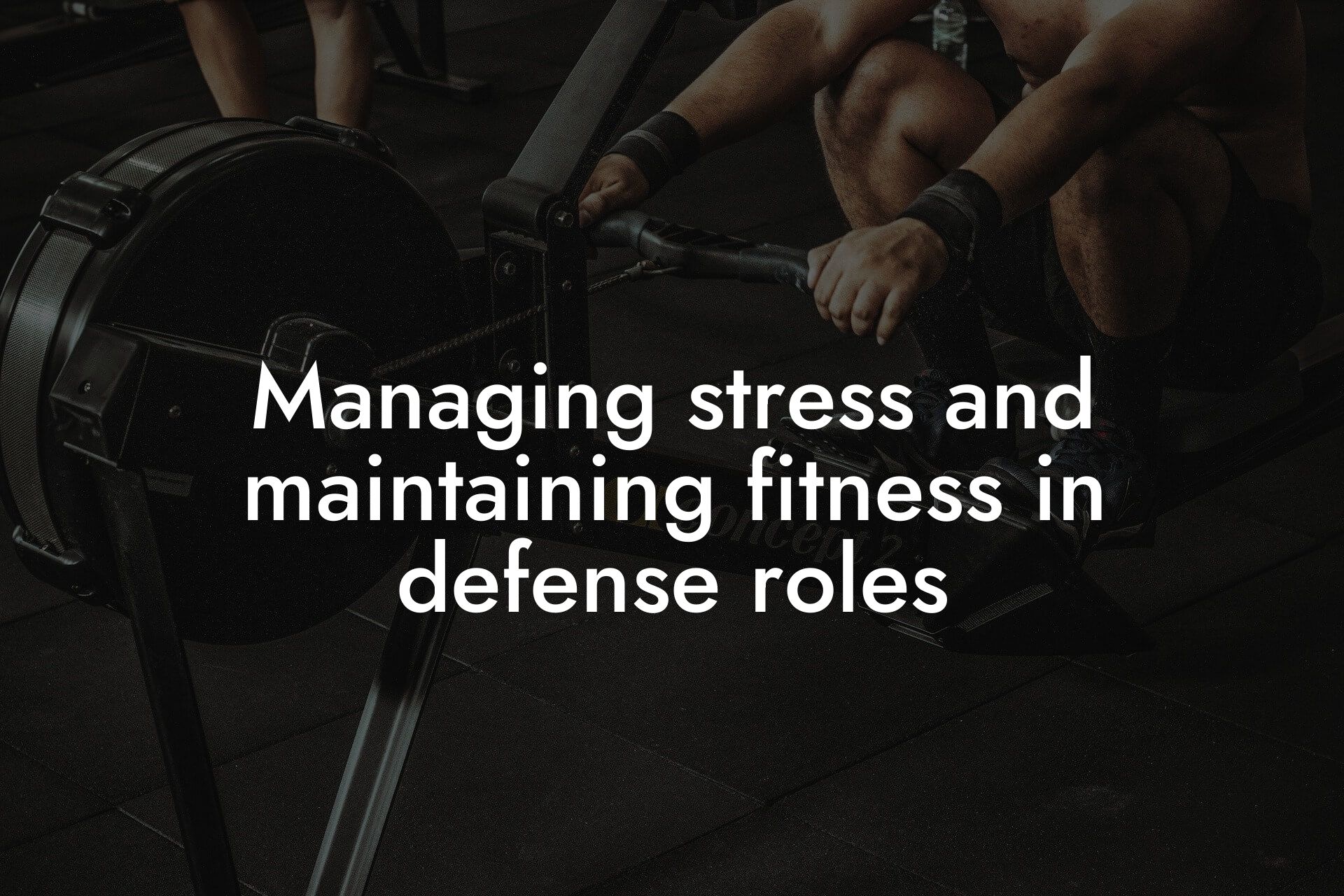As high-earning professionals, you understand the importance of maintaining peak energy levels to perform at your best. Whether you're working long hours, traveling frequently, or juggling multiple projects, it's essential to fuel your body with the right nutrition to stay energized and focused. In this article, we'll explore the top nutrition strategies for maintaining energy in the field, so you can stay on top of your game.
Table of Contents
Understanding Energy Production
Before we dive into nutrition strategies, it's essential to understand how energy is produced in the body. Energy production occurs in the mitochondria, the powerhouses of our cells. The mitochondria convert the energy from the food we eat into ATP (adenosine triphosphate), which is the energy currency of the body. When we eat, our body breaks down carbohydrates, proteins, and fats into glucose, amino acids, and fatty acids, which are then used to produce ATP.
Hydration: The Foundation of Energy
Hydration is critical for energy production. Even mild dehydration can lead to fatigue, decreased productivity, and impaired cognitive function. Aim to drink at least 8-10 glasses of water per day, and make sure to drink water regularly throughout the day. Additionally, include hydrating foods like watermelon, cucumbers, and celery in your diet.
Macronutrient Balance
A balanced diet that includes the right mix of carbohydrates, proteins, and fats is essential for maintaining energy levels. Carbohydrates provide quick energy, proteins help build and repair tissues, and fats provide sustained energy. Aim for a balanced diet that includes:
- 45-65% of daily calories from complex carbohydrates like whole grains, fruits, and vegetables
- 15-20% of daily calories from lean proteins like poultry, fish, and legumes
- 20-35% of daily calories from healthy fats like nuts, seeds, and avocados
Electrolytes: The Energy Spark
Electrolytes like sodium, potassium, magnesium, and calcium play a crucial role in energy production. They help regulate fluid balance, nerve function, and muscle contractions. Include electrolyte-rich foods like bananas, dates, coconut water, and dark leafy greens in your diet.
Foods for Sustained Energy
Certain foods are specifically designed to provide sustained energy. These include:
- Oatmeal with nuts and seeds: a complex carbohydrate-rich breakfast that provides sustained energy
- Grilled chicken with quinoa and vegetables: a protein-rich meal that includes complex carbohydrates and healthy fats
- Nuts and seeds: a healthy snack that provides sustained energy and essential fatty acids
- Fatty fish like salmon: a rich source of omega-3 fatty acids that support energy production
Snacking for Energy
Snacking is essential for maintaining energy levels throughout the day. Aim for snacks that combine complex carbohydrates, proteins, and healthy fats. Some healthy snack options include:
- Apple slices with almond butter
- Carrot sticks with hummus
- Trail mix with nuts, seeds, and dried fruits
- Protein smoothie with banana, spinach, and almond milk
Caffeine and Energy Drinks: Friend or Foe?
Caffeine and energy drinks may provide a temporary energy boost, but they can also lead to energy crashes, jitters, and decreased productivity. Limit your caffeine intake to 200-300mg per day, and avoid energy drinks that are high in sugar and artificial ingredients.
Meal Frequency and Timing
Eating regular meals throughout the day can help maintain energy levels. Aim for 3-5 main meals and 2-3 snacks in between. Additionally, consider your meal timing:
- Eat a balanced breakfast within an hour of waking up
- Eat a protein-rich snack before a workout or high-intensity activity
- Eat a complex carbohydrate-rich meal 1-2 hours before bedtime
Maintaining energy levels in the field requires a combination of hydration, macronutrient balance, electrolyte-rich foods, and strategic snacking. By incorporating these nutrition strategies into your daily routine, you'll be able to stay focused, productive, and energized throughout the day. Remember, everyone's nutritional needs are different, so experiment with different foods and strategies to find what works best for you. At Tano Performance Group, we're committed to helping high-earning professionals like you achieve peak physical performance and optimal health. Contact us today to learn more about our comprehensive body assessment and personalized nutrition coaching services.
Frequently Asked Questions
What are the most important nutrients for maintaining energy in the field?
When it comes to maintaining energy in the field, it's essential to focus on a balanced diet that includes complex carbohydrates, lean proteins, and healthy fats. These macronutrients provide the necessary fuel for your body to function optimally. Additionally, incorporating foods rich in iron, vitamin B12, and magnesium can help support energy production and reduce fatigue.
How can I prevent energy crashes during long periods of physical activity?
To prevent energy crashes, it's crucial to maintain stable blood sugar levels by consuming a balanced meal or snack every 3-4 hours. Including a source of protein and complex carbohydrates in each meal can help slow down the digestion and absorption of glucose, providing a sustained energy release. Additionally, staying hydrated by drinking plenty of water can help prevent energy crashes.
What are some healthy snack options for maintaining energy in the field?
Healthy snack options for maintaining energy in the field include nuts and seeds, dried fruits, energy bars, jerky, and trail mix. These snacks are rich in complex carbohydrates, protein, and healthy fats, providing a quick and sustained energy boost. Look for snacks that are low in added sugars, salt, and unhealthy fats.
How does dehydration impact energy levels?
Dehydration can significantly impact energy levels, leading to fatigue, headaches, and decreased physical performance. Even mild dehydration can cause a 10-15% decrease in physical performance, making it essential to stay hydrated by drinking plenty of water throughout the day. Aim to drink at least 8-10 glasses of water per day, and adjust according to your individual needs and activity level.
What is the role of electrolytes in maintaining energy?
Electrolytes, such as sodium, potassium, and magnesium, play a crucial role in maintaining energy by regulating the balance of fluids in the body and supporting nerve and muscle function. During physical activity, electrolytes are lost through sweat, making it essential to replenish them through electrolyte-rich foods and drinks, such as bananas, avocados, and coconut water.
Can caffeine help improve energy levels?
Caffeine can provide a temporary energy boost by blocking the action of adenosine, a chemical that makes us feel tired. However, relying too heavily on caffeine can lead to energy crashes and decreased physical performance. It's recommended to consume caffeine in moderation, ideally 1-2 cups per day, and avoid it altogether 4-6 hours before bedtime.
How does sleep impact energy levels?
Sleep plays a critical role in maintaining energy levels, with research showing that even one night of poor sleep can lead to a 10-15% decrease in physical performance. Aim for 7-9 hours of sleep per night, establish a consistent sleep schedule, and create a sleep-conducive environment to optimize energy levels.
What are some strategies for managing stress and maintaining energy?
Effective stress management is crucial for maintaining energy levels. Strategies for managing stress include deep breathing exercises, meditation, yoga, and prioritizing tasks to reduce feelings of overwhelm. Additionally, incorporating relaxation techniques, such as progressive muscle relaxation and visualization, can help reduce stress and promote energy.
How can I maintain energy levels during periods of high physical activity?
To maintain energy levels during periods of high physical activity, it's essential to prioritize nutrition, hydration, and recovery. Focus on consuming a balanced diet that includes complex carbohydrates, lean proteins, and healthy fats, and stay hydrated by drinking plenty of water. Additionally, incorporate recovery techniques, such as foam rolling, stretching, and massage, to reduce muscle soreness and promote energy.
What are some common energy-boosting supplements?
Common energy-boosting supplements include vitamin B12, iron, magnesium, and creatine. While these supplements can provide a temporary energy boost, it's essential to consult with a healthcare professional before adding them to your regimen. Additionally, prioritize a balanced diet and healthy lifestyle habits to support sustained energy levels.
How does meal frequency impact energy levels?
Meal frequency can significantly impact energy levels, with research showing that eating smaller, more frequent meals can help maintain stable blood sugar levels and provide a sustained energy release. Aim for 3-5 main meals and 2-3 snacks per day, and adjust according to your individual needs and activity level.
What is the role of protein in maintaining energy?
Protein plays a critical role in maintaining energy by providing the necessary building blocks for muscle growth and repair. Incorporating a source of protein in each meal can help slow down the digestion and absorption of glucose, providing a sustained energy release. Aim for 1.2-1.6 grams of protein per kilogram of body weight per day.
How does bone density impact energy levels?
Bone density can impact energy levels, with research showing that individuals with low bone density are more likely to experience fatigue and decreased physical performance. Incorporating calcium and vitamin D-rich foods, such as dairy, leafy greens, and fortified cereals, can help support bone density and maintain energy levels.
What are some strategies for maintaining energy during long periods of mental activity?
Strategies for maintaining energy during long periods of mental activity include taking regular breaks, incorporating physical activity, and prioritizing nutrition and hydration. Additionally, incorporating relaxation techniques, such as deep breathing exercises and meditation, can help reduce mental fatigue and promote energy.
How does body fat percentage impact energy levels?
Body fat percentage can impact energy levels, with research showing that individuals with a higher body fat percentage are more likely to experience decreased physical performance and fatigue. Prioritizing a healthy diet and regular exercise can help maintain a healthy body fat percentage and support energy levels.
What are some common energy-draining foods?
Common energy-draining foods include sugary drinks, refined carbohydrates, and processed snacks. These foods can cause a rapid spike in blood sugar levels, followed by a crash, leading to energy crashes and decreased physical performance. Opt for whole, nutrient-dense foods to support sustained energy levels.
How does hydration impact physical performance?
Hydration plays a critical role in physical performance, with even mild dehydration leading to decreased physical performance and fatigue. Aim to drink at least 8-10 glasses of water per day, and adjust according to your individual needs and activity level.
What are some strategies for maintaining energy during periods of high stress?
Strategies for maintaining energy during periods of high stress include prioritizing nutrition, hydration, and recovery. Focus on consuming a balanced diet, staying hydrated, and incorporating relaxation techniques, such as deep breathing exercises and meditation, to reduce stress and promote energy.
How does physical activity impact energy levels?
Regular physical activity can significantly impact energy levels, with research showing that individuals who engage in regular physical activity experience increased energy levels and improved physical performance. Aim for at least 150 minutes of moderate-intensity exercise per week, and adjust according to your individual needs and goals.
What are some common energy-boosting foods?
Common energy-boosting foods include bananas, avocados, nuts, and seeds. These foods are rich in complex carbohydrates, healthy fats, and protein, providing a sustained energy release. Incorporate these foods into your diet to support energy levels.
How does magnesium impact energy levels?
Magnesium plays a critical role in energy production, with research showing that magnesium deficiency can lead to fatigue, decreased physical performance, and muscle cramps. Incorporate magnesium-rich foods, such as dark leafy greens, nuts, and seeds, into your diet to support energy levels.
What are some strategies for maintaining energy during periods of travel?
Strategies for maintaining energy during periods of travel include prioritizing nutrition, hydration, and recovery. Focus on consuming a balanced diet, staying hydrated, and incorporating relaxation techniques, such as deep breathing exercises and meditation, to reduce stress and promote energy.
How does vitamin B12 impact energy levels?
Vitamin B12 plays a critical role in energy production, with research showing that vitamin B12 deficiency can lead to fatigue, decreased physical performance, and neurological symptoms. Incorporate vitamin B12-rich foods, such as lean meats, fish, and dairy, into your diet to support energy levels.
What are some common energy-draining habits?
Common energy-draining habits include skipping meals, consuming high amounts of caffeine and sugar, and neglecting physical activity. Prioritize a balanced diet, regular physical activity, and healthy lifestyle habits to support sustained energy levels.
Here are some related articles you might love...
- How to maintain bone density in physically demanding military jobs
- Managing stress and maintaining fitness in defense roles
- How to prevent injury through physical fitness in the military
- Balancing military duties with personal fitness goals
- Quick workouts for military professionals during downtime
- The role of DEXA scans in military health assessments
- The impact of body composition on tactical performance
- How to maintain fitness during deployment
- The importance of physical fitness for military readiness
Zak Faulkner
Zak Faulkner is a leading authority in the realm of physical health and body composition analysis, with over 15 years of experience helping professionals optimise their fitness and well-being. As one the experts behind Tano Performance Group, Zak has dedicated his career to providing in-depth, science-backed insights that empower clients to elevate their physical performance and overall health.
With extensive knowledge of DEXA technology, Zak specializes in delivering comprehensive body assessments that offer precise data on body fat, muscle mass, bone density, and overall physique. His expertise enables individuals to make informed decisions and achieve their fitness goals with accuracy and confidence. Zak’s approach is rooted in a deep understanding of human physiology, combined with a passion for helping clients unlock their full potential through personalised strategies.
Over the years, Zak has earned a reputation for his commitment to excellence, precision, and client-focused service. His guidance is trusted by top professionals who demand the best when it comes to their health. Whether advising on fitness programs, nutritional strategies, or long-term wellness plans, Zak Faulkner’s insights are a valuable resource for anyone serious about taking their health and fitness to the next level.
At Tano Performance Group, Zak continues to lead our Content Team revolutionising how professionals approach their physical health, offering unparalleled expertise that drives real results.




